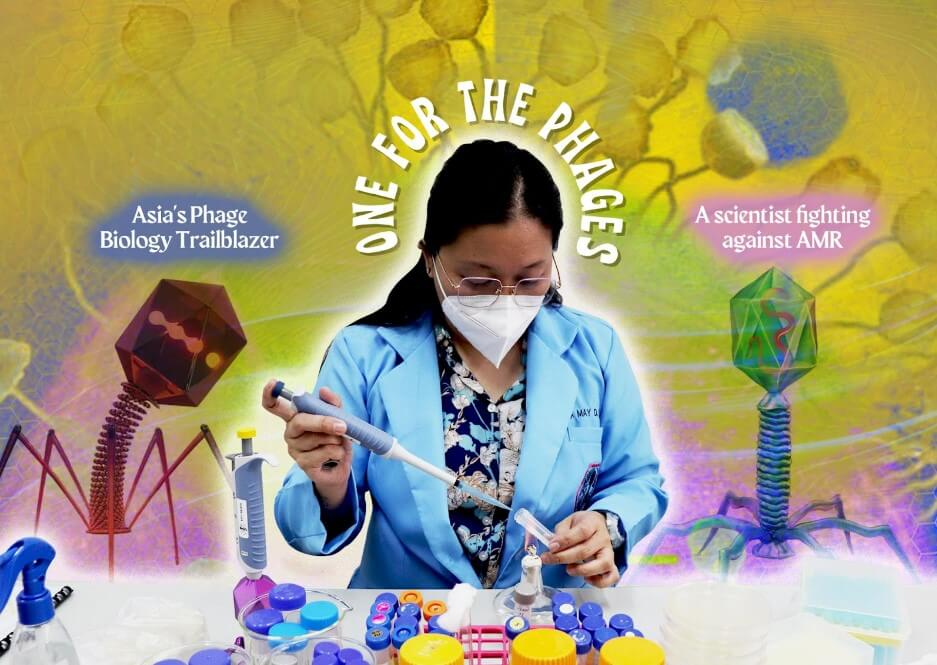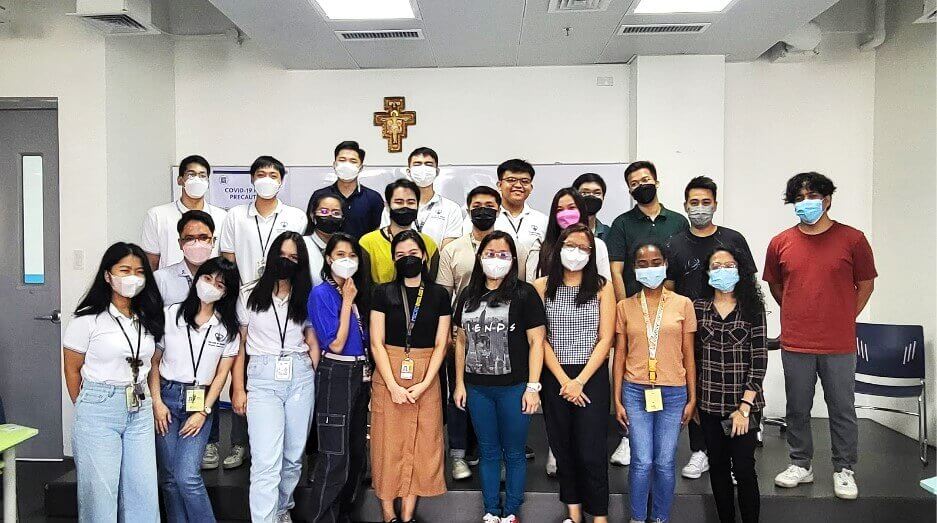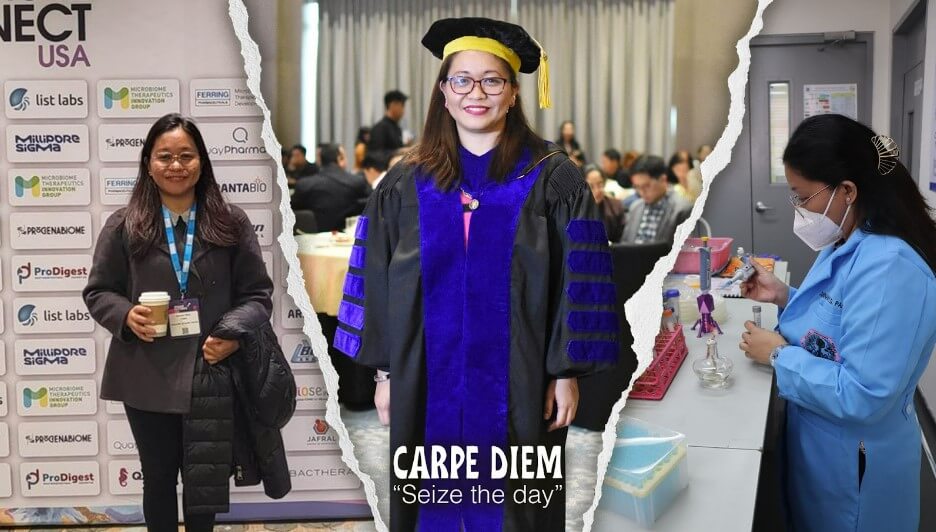Dr. Papa’s Impact Is Viral: Meet The Trailblazer of Phage Biology in Asia!
By: Qjiel Mariano
|
Published on: June 14, 2023

Dr. Papa in the lab doing her research on Phage Biology to combat antimicrobial resistance. Photo edited by Qjiel Mariano
In her younger years, Donna Papa kindly asked maintenance personnel if she could use a piece of worn laboratory equipment thrown in the trash by her peers to test out her ideas for Phage Biology. The result? A lifetime of advocacy to combat antimicrobial resistance in aquaculture, horticulture, and health.
Dr. Donna Papa is a scientist, associate professor, and global health advocate from the Philippines who led pioneering phage research. She has traveled across the world to learn about phages, which are viruses that infect and replicate only in bacterial cells. When you ask experts in the field on various continents about who the contact person in Asia is for this research, at the top of their minds is a humble Filipina from the University of Santo Tomas.
The road less traveled
The scientist advocate received her credentials from bachelor to doctorate from the University of Santo Tomas. You could liken her career to being cultured in Asia’s oldest university as she graduated with a medical technology degree that paved the way to a master’s in Microbiology and a Ph.D. in Biological Sciences.
Like most success stories, it was a rough start for Donna. “Honestly, I was laughed at. They told me phage research would never work here in the Philippines.” She recalled her time maximizing the worn-out equipment in the lab while doing her Ph.D. While her research eventually picked up the pace, Dr. Papa experienced mentoring one student, then three students, and now at least 20 students every year who are interested in bacteriophages.
Today, her research on bacteriophages impacts human health by means of providing alternatives to antibiotic-resistant bacteria. “It takes years to perfect drugs, but it only takes a few days to culture a phage,” she reflected in consideration of the growing threat of antimicrobial resistance. This provides us with a cost-friendly alternative to address infections inside the human body. She recalls a specialized center in Georgia called the George Eliava Institute. “I am fortunate to visit this center in July and learn more about their work!” she proudly shared.
On the other hand, bacteria that affect animal and plant life also benefit from phages. “Phages do not kill animal cells, plant cells, algae, or plankton.” She shared expert advice on how they are used in the country. This is important for our food sector in the Philippines. “Some parts of the world have bacteriophages as part of the food systems and are FDA approved,” she continued.

Dr. Papa poses with her students from the UST College of Science. ©Dr. Donna Papa
Dr. Papa does not measure her success to awards and laurels alone. Her groups have gone in to win research awards locally and globally. Her students are already in line for opportunities abroad and continue their postgraduate studies at UST. She draws strength in her work from the students who followed her on the road less taken.
Together with Phages for Global Health, the Bacteriophage Ecology, Aquaculture, Therapy and Systematics (BEATS) Research Group organized the first hands-on workshop on bacteriophages in southeast Asia. Tobi Nagel, the CEO of Phages for Global Health was a key enabler in the workshop to be organized in UST. “We have experts from the UK, Thailand, and Malaysia, who all came to UST for this workshop and my students were excited to meet them” She recalled as these experts in phage biology were their citations in research papers – but now her students get to meet them in the flesh.
While you may consider her research group small, Dr. Papa has a big responsibility in manifesting successful careers for everyone. “I uplift them by observing their strengths be it in the medical field, food industry, academia, or laboratory work,” she shared proudly.
Dr. Papa fondly recalls her time as a pioneer in Phage research as there were no grants, scholarships, or funding related to this field. “I did not have a scholarship. I asked money from my parents then continued doing what I do for the sake of my work,” she shared. Today’s generation is fortunate as more research about her field is growing and now her students can get more resources to pursue this field. “They have access to the internet so now they can email any expert from all over the world and receive mentorships,” Dr. Papa shared while reinforcing the lifelong friendships you make along the way.
One for the PHAGES

(From left to right) Dr. Papa at a Phages conference in Boston, Dr. Papa in the Philippine Association of Microbiology, and Dr. Papa in the Lab. ©Dr. Donna Papa edited by Qjiel Mariano.
Her work in phage biology is indelible in our records as she is a shining example of both a pioneer and a trailblazer. When asked about what it means to be a scientist, this is Dr. Papa’s answer. “I live by my favorite quote ‘carpe diem’ or seize the day,” she shared. Growing up, Dr. Papa knew she may not have been the brightest student, but she always made it a point to seize every opportunity that may come her way and share it with others.
Aside from being able to travel abroad, making impactful contributions, and educating the next generation – Donna believes her role as a scientist is the best thing that has ever happened in her life. “We may not have the best labs, multi-million dollar equipment, or the like – but we maximize our resources to make a difference,” she reflected in her years of teaching at the university. If you want to support life-changing research like Dr. Papa’s – you may contact the UST College of Science for ways and means of support!
Indeed, her legacy is present as the phage community echoes her name as a leading scientist in phage research, and she brings with her the privilege that is to be Filipino.
READ MORE from Qjiel Mariano here:
- Dr. Eileen De Villa’s Excellence: How the People’s Doctor of Toronto Honors Filipino Roots
- Rwanda forever! A Filipino’s purposeful visit to the Land of Thousand Hills
Qjiel Mariano is the newest Good News Pilipinas columnist. The York University Global Health student was selected to join the Clinton Global Initiative Class, awarded the George H.W. Bush Inspiration Honors, and named Education Hero by Youth Service America.
Good News Pilipinas is a Lasallian Scholarum Awardee. TELL US your good news story tips by messaging GoodNewsPilipinas.com on Facebook, Twitter, or Instagram, or e-mailing editor@goodnewspilipinas-com-256437.hostingersite.com
